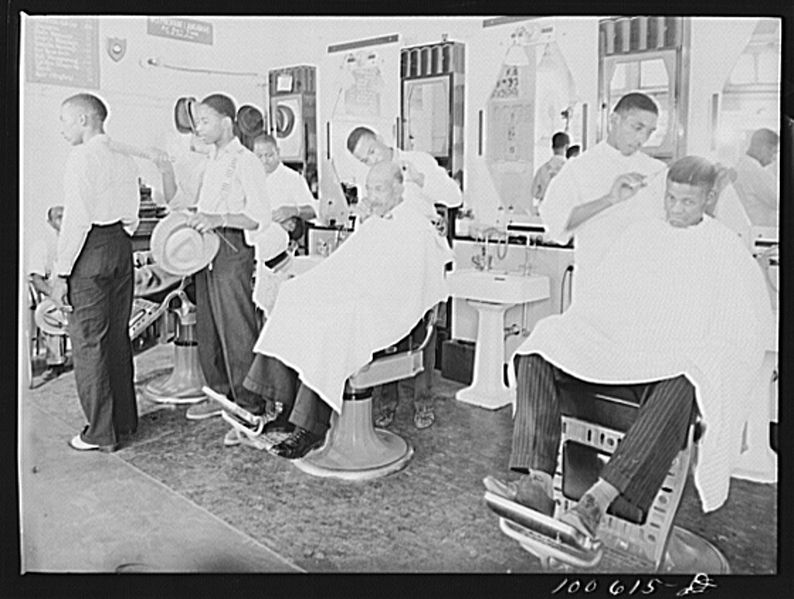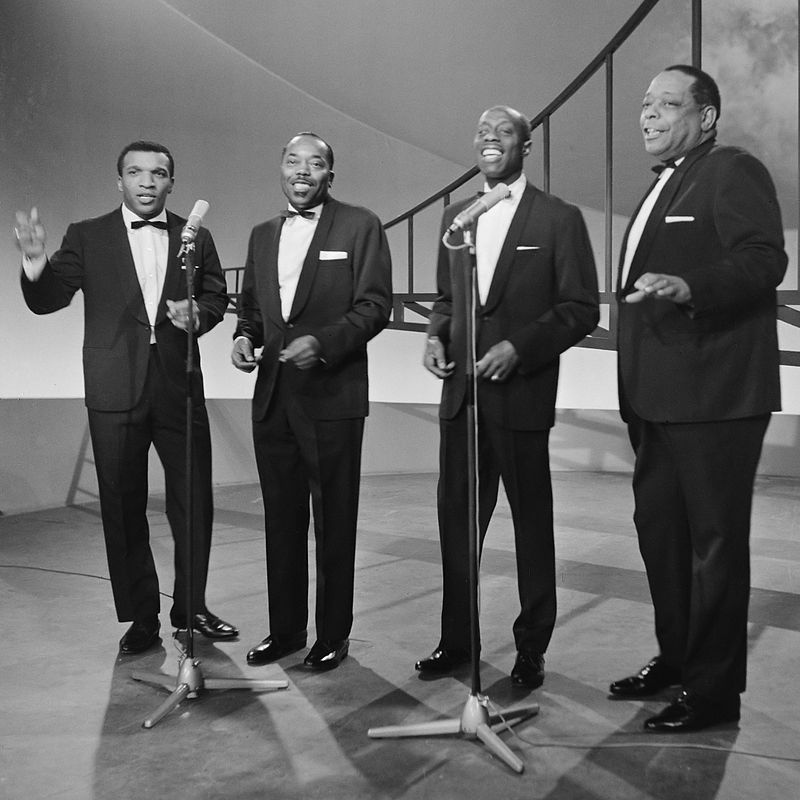
Performers of Gospel Music and Their Techniques: Quartets
Before reading about the ubiquitous presence of gospel quartets during the golden age of Gospel, watch and listen to the Sensational Nightingales perform their famous song Somewhere to Lay My Head"(ca. 1955):

The Sensational Nightingales - "Somewhere To Lay My Head" [ 00:00-00:00 ]
The popularity of "gospel quartets" that began during the early Gospel period was even more popular in the golden age of Gospel, the 1940s to 1960s. And before early gospel quartets, there is evidence to support the idea of the quartet singing style or "cracking the chord" was a pastime activity among Black men at barbershops, hence the term "barbershop harmony." "Barbershop harmony is one of the great American inventions," writes Abbot. Though some equate barbershop harmony "with dapper, White, middle-American barbers and their patrons posed next to barber poles in attitudes of harmonizing," Abbot argues, "there is … little in the mainstream literature of the period to reinforce this image. The literature of African American history, on the other hand, is shot through with references to barbershop singing. These references strongly suggest an African American origin for both the concept of male quartet singing in barbershops and the style of harmonizing that has come to be known as 'barbershop'" (Abbott 1992, 289).
Indeed, seeing a group of African American males singing to pass the time was omnipresent at Black barbershops, a place for not only haircuts but for general socializing about the news, speaking about various topics, playing checkers and cards, drinking, and, of course, singing. It was common for barbershops to have a backroom where these activities occurred. Compounded with segregation and the goal of creating a safe public space for Black folks, the barbershop was a local hangout. Soon there appeared contests among city quartets and eventually outside the city. However, the question remains, what type of singing were they doing and was it linked to the style of quartet singing in gospel music? The answer lies in the practice of being clever with harmony. The term "cracking up a chord" implied producing the equivalent of "close-harmony," which meant to break up a chord into parts such as a lead (tenor), two or three voices (tenor, baritone, and bass) harmonizing and accompanying the lead singer. These vocal groups sang joyously, especially when participants discovered a new chord or harmony.
Whether love ballads, religious melodies, fun topics, or something else, these groups focused more on harmony and how it interacted with a solo singer. It is essential to note barbershops were not the only places where people heard the music, as these groups sang at street corners, front stoops (the porch), schoolyards, railroads, and lodges-just about anywhere that was a place to hang out. Because the church was the cornerstone of the African American community, this singing style slowly entered the church. By the 1920s, it greatly influenced the quartet style of singing we know today.
In the second half of the 1920s, recordings of quartets increased markedly, and records often sold in significant quantities. Some of Columbia's 1926 recordings of the Birmingham Jubilee Singers, for example, sold as many as 15,000 copies (Dixon and Godrich year, 273). Alongside this growth in numbers and sales, some groups' recorded repertoire-such as the Bessemer Quartet-changed from a mix of sacred and secular to exclusively sacred. In contrast, others, such as the Biddleville Quintet, remained entirely within the sacred confines from the outset. The musical idiom of quartet singing was evolving into a more complex form, melding established practices (for example, antiphonal singing), expanded vocal roles (for example, in the lines given to the bass), and new rhythmic and harmonic trends from the secular world of jazz and blues. Gradually, these quartets began incorporating the word "gospel" into their name-for instance, the Jubilee Gospel team, who recorded in 1928-30, or the Heavenly Gospel Singers, who began their recording career in 1935.
Precious Lord
Through the storm, through the night
Lead me on to the light
Take my hand precious Lord, lead me home
It's a Highway to Heaven
It's a highway to heaven
None can walk up there
But the pure in heart
It's a highway to heaven
Walking up the king's highway







